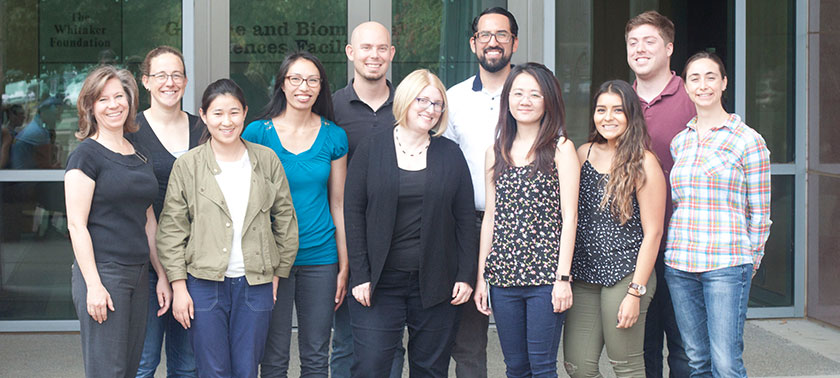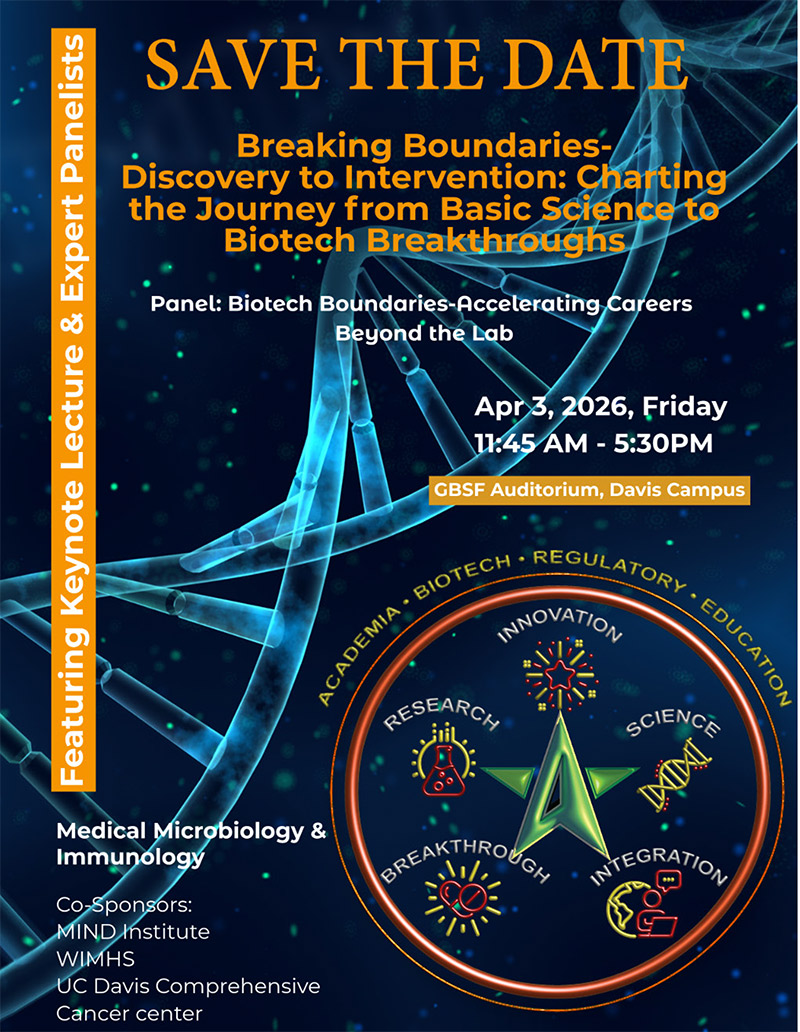Renee Tsolis, Ph.D.

Professor
GBSF Room 5519
Davis Campus
530-754-8497
rmtsolis@health.ucdavis.edu
Research Interests
Interactions between intracellular pathogens and the host Our group studies basic mechanisms by which bacterial pathogens can subvert the host’s innate immune system to survive within phagocytic cells and resist clearance by the immune response. Our work primarily utilizes two pathogens, Brucella abortus, and Salmonella enterica serotype Typhimurium, to uncover new principles of how bacteria utilize virulence factors and adapt their metabolism to grow within the host environment.
Brucella abortus: a zoonotic pathogen causing chronic infection Our work on the zoonotic pathogen Brucella abortus has focused on a virulence factor called the Type IV secretion system. We are interested in how this system mediates persistent infection by injecting proteins into the infected host cell to modulate the function of the host cell’s endoplasmic reticulum. A recent study from our lab also uncovered how the host cell detects this hijacking of the endoplasmic reticulum and responds with inflammation.
A second question we are asking with Brucella is how an intracellular pathogen adapts its metabolism to persist within certain populations of cells. We recently found that Brucella causes chronic infections by persisting within a specific population of macrophage known as an alternatively activated macrophage. This cell type provides a higher level of nutrients that allows Brucella to grow and persist in these cells.
Non-typhoidal Salmonella bloodstream infections Salmonella enterica serotype Typhimurium is normally caused by ingesting contaminated food and causes a self-limiting diarrheal disease. However in some individuals, the immune response is unable to contain the infection, and a life-threating bloodstream infection can result. In sub-Saharan Africa, clinical epidemiologists noted a high prevalence of bloodstream infections in children, particularly when the children had malaria or were malnourished. We have been studying why these individuals are at greater risk for disseminated infection, and have uncovered new mechanisms by which co-infections and comorbidities can affect the host’s ability to contain an infection, including effects on the gut microbiota and suppression of phagocytic cell function.
Graduate Group Affiliations
A complete listing of Professor Tsolis' published work can be found here

Lab Manager: Briana Young, M.S.
Graduate Students:
- Annica Stull-Lane, Integrative Pathobiology/PSTP student
- Lizbeth Camacho, Microbiobiology Ph.D. student
- Amber van Hecke, Integrative Pathobiology Ph.D. student
- Beau Parry, Microbiology Ph.D. student
Postdoctoral Fellows:
- Vladimir Diaz-Ochoa, Ph.D.
- Bevin English, Ph.D.
- Leticia Lazaro Anton, Ph.D.
- Aurore Demars, Ph.D.
Undergraduate Students:
- Nelly Escalante, MARC Scholar
Former Graduate Students and Visiting Graduate Students:
- Andreas den Hartigh, Ph.D., Postdoc, University of Washington
- Hortensia García Rolán, Ph.D., Postdoc, Tufts University
- Tatiane Alves da Paixão, D.V.M., Ph.D., Professor, Univerdisade Federal de Minas Gerais, Brazil
- Brian Butler, D.V.M., M.P.H., Ph.D., Dipl. ACVP, Associate Professor, St. George’s University
- Maarten de Jong, Ph.D., Postdoc, UT Southwestern Medical Center
- Vidya Atluri, M.D., Ph.D., Infectious Diseases Fellow, University of Washington
- Teane M.A. Silva, D.V.M., Ph.D., Assistant Professor, Instituto Federal Catarinense, Santa Catarina, Brazil
- Jason Mooney, Ph.D., Research Fellow, Roslin Institute, UK
- Kristen Lokken, Ph.D., Postdoctoral Fellow, New York University
- Mariana Xavier Byndloss, C.V.M., Ph.D., Assistant Professor, Vanderbilt University
- Guiyan Yang, Postdoctoral Fellow, UC Davis Medical Center
- Irati Poveda, D.V.M., Ph.D student, University of Navarra
- Greg Walker, Ph.D., Postdoc, UC San Diego
- April Tsai, Ph.D., Postdoc, NCHU, Taiwan
Former Undergraduate Students:
- Alan Tubbs, BS Currently Ph.D. student, UNC Chapel Hill
- Nada Sayed, Microbiology major, Currently Student in UC Davis Clinical Laboratory Science Graduate Program
- Ariel Muñoz, currently M.P.H .student, UC Berkeley
- Aranza Reynoso, Research Associate, BioLegend
- Jorge Rodriguez
Former Postdocs and Visiting Professors:
- Yao-Hui Sun, M.D., Ph.D., Research Scientist, UC Davis
- Christelle Roux, Ph.D., Scientist, CUBRC, Inc., Biological and Medical Sciences Group
- Renato de Lima Santos, D.V.M., Ph.D., Professor, Universidade Federal de Minas Gerais, Brazil
- Tobias Kerrinnes, Ph.D., Head of Laboratory, Helmholtz Infection Research Institute, Germany
- Núbia Seyffert, Ph.D., Research Scientist, University of Pará, Belem, Brazil
- Ramie Husneara Begum, Ph.D., Assistant Professor, Assam University, India
- Lattha Souvannaseng, Ph.D., Research Associate at UC Davis Mouse Biology Program




